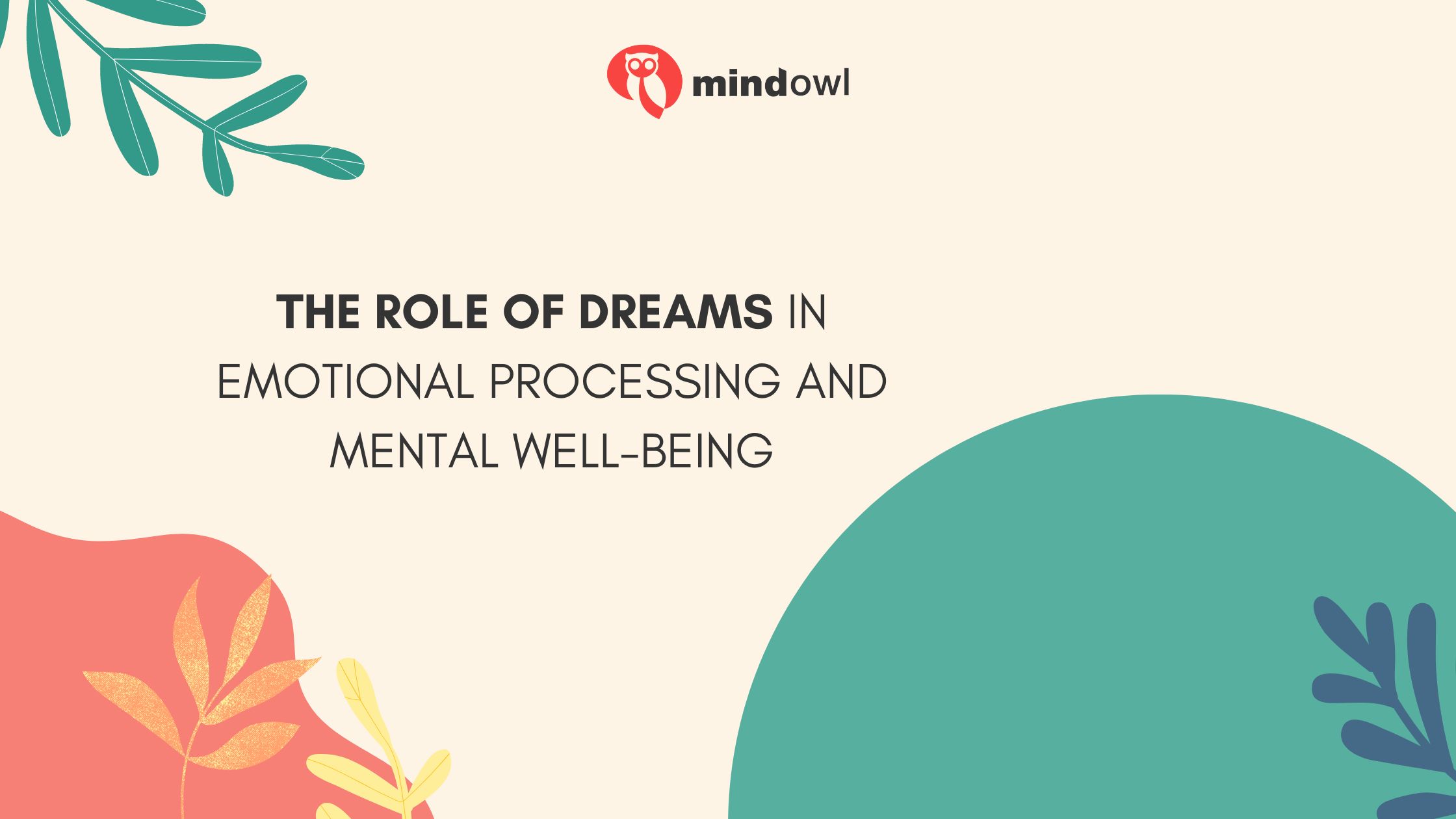Intriguing and captivating, dreams capture the attention of scientists, psychologists, and philosophers across the globe. This article plunges into their fascinating world, highlighting their significant role in emotional processing and mental well-being. The exploration will start with understanding the scientific nature of dreams and proceeds to decipher various theories that interpret them. Read on to learn more.

Understanding Dreams
Dreams are complex narratives that occur during sleep. Attracting significant scientific focus, these stories take place predominantly during the rapid eye movement (REM) sleep stage. As dreams intersect with neural pathways and psychological processes, they become an integral part of human cognition and emotional regulation.
- Theoretical Perspectives On Dreams
Psychoanalyst Sigmund Freud proposed that dreams serve as a ‘royal road to the unconscious,’ unmasking hidden desires and feelings. On the other hand, modern cognitive theories provide an alternate view, suggesting that dreams might act as mechanisms for memory consolidation, problem-solving, and facilitating cognitive simulations.
- Dreams And Emotional Processing
The continuity hypothesis of dreams further emphasizes the importance of dreams in emotional processing. It asserts that emotions experienced during wakefulness are reflected in dreams, indicating a connection between dream narratives and emotional states. Stressful real-life situations may, thus, be mirrored as stressful scenarios in dreams, underlining the role of dreams as a processing hub for daily emotional experiences.
- The Threat Simulation Theory
Adding another layer to the understanding of dreams, the threat simulation theory presents a compelling argument. It posits that dreams offer a platform to rehearse threatening situations, which may be those encountered in reality or ones originating from imagination. This suggests that dreams can help enhance readiness for emotional responses when awake.
With these theories and research, it becomes clear that dreams are not merely random neural firings during sleep. Instead, they serve as potent tools for emotional processing, significantly enhancing the understanding of human cognition and emotional well-being.
Dream Interpretation And Psychoanalysis
Dream interpretation holds a crucial place in exploring the human psyche across cultures and ages. Its significance was amplified with the emergence of psychoanalysis, thanks to Sigmund Freud’s emphasis on dreams.
What do dreams mean az? Today, it embraces a more nuanced approach. Here are a few examples, drawing from both traditional Freudian interpretations and modern views:
- Dreams About Flying Or Falling
In traditional psychoanalytic theory, dreams of flying might represent desires for freedom or escape, while falling could symbolize fear of failure or loss of control. Modern interpretation may see them as reflecting experiences from the waking life, like the feeling of elation or anxiety.
- Dreams About Being Chased
These dreams could be interpreted as an expression of fear or avoidance in waking life. The identity of the pursuer can provide additional insight into what the dreamer might be running away from.
- Dreams About Losing Teeth
Traditionally, this could symbolize anxiety about appearance and how others perceive you. However, a more contemporary interpretation might see it as a reflection of a situation causing anxiety or a sense of loss in real life.
- Dreams About Water
Water in dreams can be seen as a symbol of emotions in psychoanalytic interpretation. The state of the water may reflect the dreamer’s emotional state. For example, calm water might represent peace and tranquility, while turbulent water could symbolize emotional turmoil or uncertainty.
- Dreams About Houses
In Freudian interpretation, houses often symbolize the self or the mind. Different rooms could represent different aspects of the dreamer’s psyche. For instance, the basement might represent what’s been relegated to the unconscious, while more public spaces, like the living room, could represent what the dreamer is comfortable sharing with others.
- Dreams About Tests Or Exams
These dreams could be seen as an indication of self-evaluation, fear of not measuring up, or being unprepared for a challenge in the waking life.
These interpretations can vary greatly depending on the context and personal experiences of the dreamer. It’s also essential to remember that these are just interpretations, not definitive explanations. The actual significance of dreams can be incredibly subjective and unique to each individual.
Strategies To Improve Dream Recall And Understanding
Recalling dreams and making sense of them can be a challenge. However, specific strategies can enhance dream recall and understanding, paving the way for a deeper connection with one’s subconscious mind.
- Keeping A Dream Journal
Writing down dreams first thing after waking up can significantly improve recall. Over time, a dream journal can also reveal patterns and themes that might have significant personal meanings.
- Practicing Mindfulness
Mindfulness and meditation practices can increase awareness of one’s thoughts and feelings, which can extend to dreams. They can also improve dream recall and the ability to become lucid in dreams.
- Looking For Recurring Themes
Identifying recurring themes or symbols in dreams can provide valuable insights into personal emotional processes. Sometimes, these can reflect ongoing life challenges or aspirations, offering a new perspective on how to approach them.
- Dream Sharing And Discussion
Talking about dreams with others, in dream-sharing groups or with a therapist, can help in understanding them from different perspectives.
Increased dream awareness can provide a richer understanding of one’s emotional world, thereby potentially enhancing emotional processing and mental well-being. Cultivating these practices could open up a new avenue for self-exploration and personal growth.

The Emotional Processing Of Dreams
Dreams often involve scenarios that elicit both positive and negative emotions. These situations provide an avenue for the mind to process these emotions in a safe environment. They allow an individual to confront feelings and reactions, resulting in a deeper understanding of personal emotional responses.
- Empirical Evidence On Dreams Processing Emotions
Multiple studies in the field of dream psychology provide empirical evidence supporting the idea that dreams are instrumental in processing emotions. For instance, research exploring dreams’ role in resolving distressing incidents shows that those who have encountered such incidents often relive them in their dreams. The dreamer often confronts the source of trauma, aiding in the emotional healing process.
- REM Sleep And Emotional Processing
The connection between REM sleep and emotional processing has also been widely recognized. REM sleep, during which dreaming most commonly occurs, is known to be associated with emotional processing. It is during this phase of sleep that dreams, often charged with emotions, are most vivid. This suggests a correlation between REM sleep, dreams, and emotional well-being.
- Dreams And Mood Regulation
Lastly, dreams have a profound impact on mood regulation. They allow an individual to experience a range of emotions within a safe and controlled environment.
By navigating through these emotional scenarios, individuals can potentially manage and regulate their moods better when awake. This underscores their contribution to mental well-being.
Dreams And Mental Well-Being
Dreams are a window into the mind and serve more purposes than one might realize. They not only act as emotional processing tools but also significantly contribute to overall mental well-being.
- Dreams As Reflectors Of Mental Health
The frequency, nature, and content of dreams can often mirror an individual’s mental health status. Recurring nightmares or dreams with distressing content might indicate underlying stress, anxiety, or trauma. For instance, an individual under severe stress might experience dreams filled with situations that evoke feelings of panic or uneasiness.
Understanding such dream patterns could act as an early warning system, allowing individuals to seek help before the onset of more serious problems.
- Dreams And Creative Problem-Solving
In addition to being a mirror of mental health, dreams can also foster creative problem-solving. The dreaming mind creates unique scenarios and unexpected combinations of ideas that can lead to creative insights upon waking. This creativity might not just be limited to artistic or professional pursuits; it can also apply to personal life problems. Hence, paying attention to dreams might unlock innovative solutions and improve mental agility.
- Lucid Dreaming And Its Therapeutic Potential
Lucid dreaming, where one consciously controls their dreams, presents significant therapeutic potential. It can act as a form of rehearsing success scenarios, battling fears, or even reshaping recurring nightmares. By gaining control over their dream landscape, individuals can confront and overcome their anxieties in a safe, controlled environment.
- Dreams And Personal Growth
Lastly, understanding and interpreting dreams can significantly contribute to personal growth and self-improvement. Keeping a dream journal, looking for patterns, and deriving insights from dream content can fuel self-awareness and personal development. Dreams can act as a mirror to one’s subconscious mind, helping individuals understand their deepest fears, aspirations, and emotional responses better, thereby facilitating emotional growth.
Dreams act as a multidimensional tool, fostering creative solutions, enabling personal growth, and reflecting psychological well-being. Their potential marks an exciting frontier in understanding mental health.
Conclusion
It cannot be denied that dreams are a contributing factor in emotional processing and mental well-being. From serving as mirrors to mental health and aiding in problem-solving, to fostering personal growth, they play pivotal roles.
It’s crucial to acknowledge and respect dreams, as they are not merely random nighttime images but powerful tools that could help enhance emotional health and overall well-being. Investing time in recalling and understanding dreams could offer profound personal insights and contribute positively to mental health.
MindOwl Founder – My own struggles in life have led me to this path of understanding the human condition. I graduated with a bachelor’s degree in philosophy before completing a master’s degree in psychology at Regent’s University London. I then completed a postgraduate diploma in philosophical counselling before being trained in ACT (Acceptance and commitment therapy).
I’ve spent the last eight years studying the encounter of meditative practices with modern psychology.

